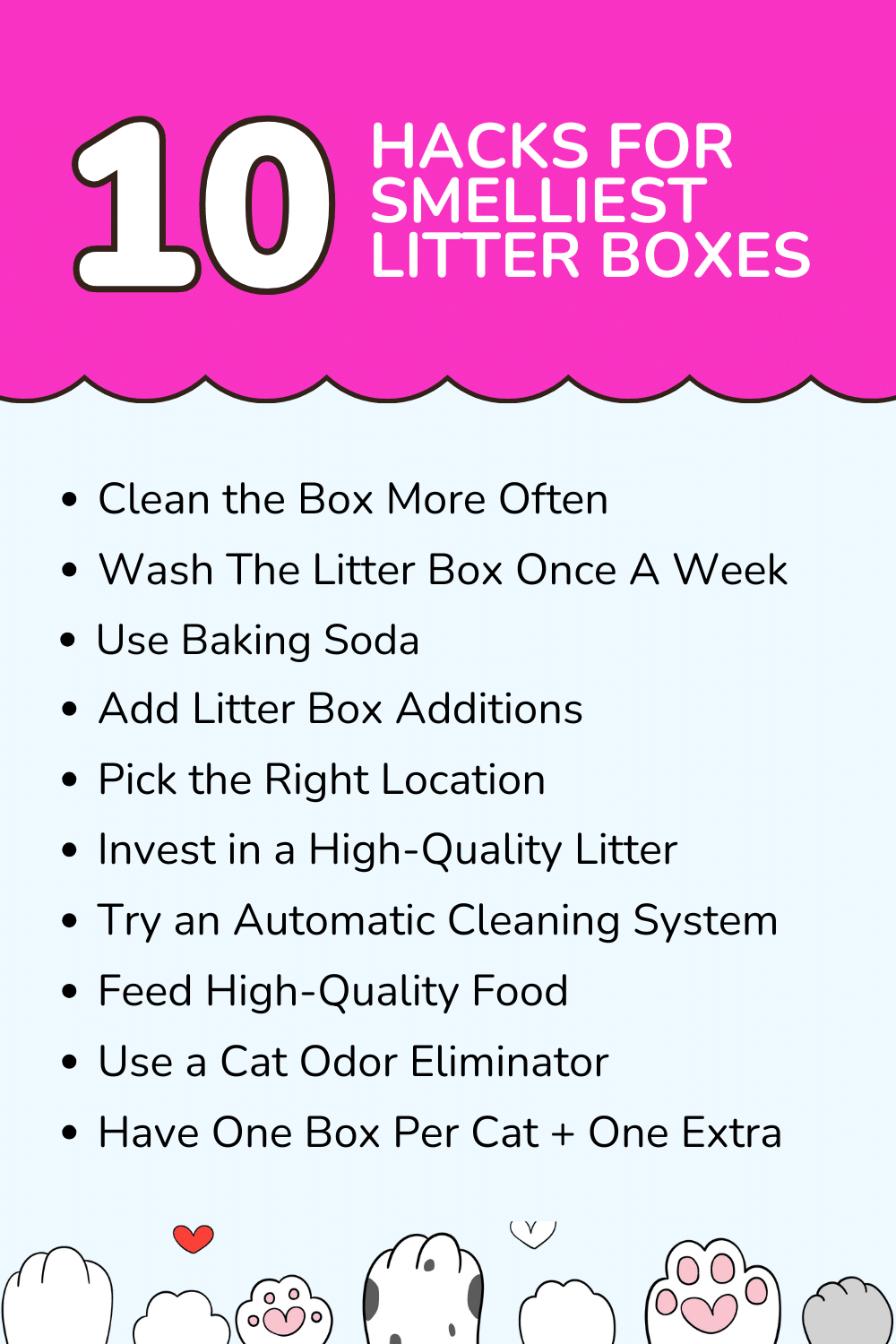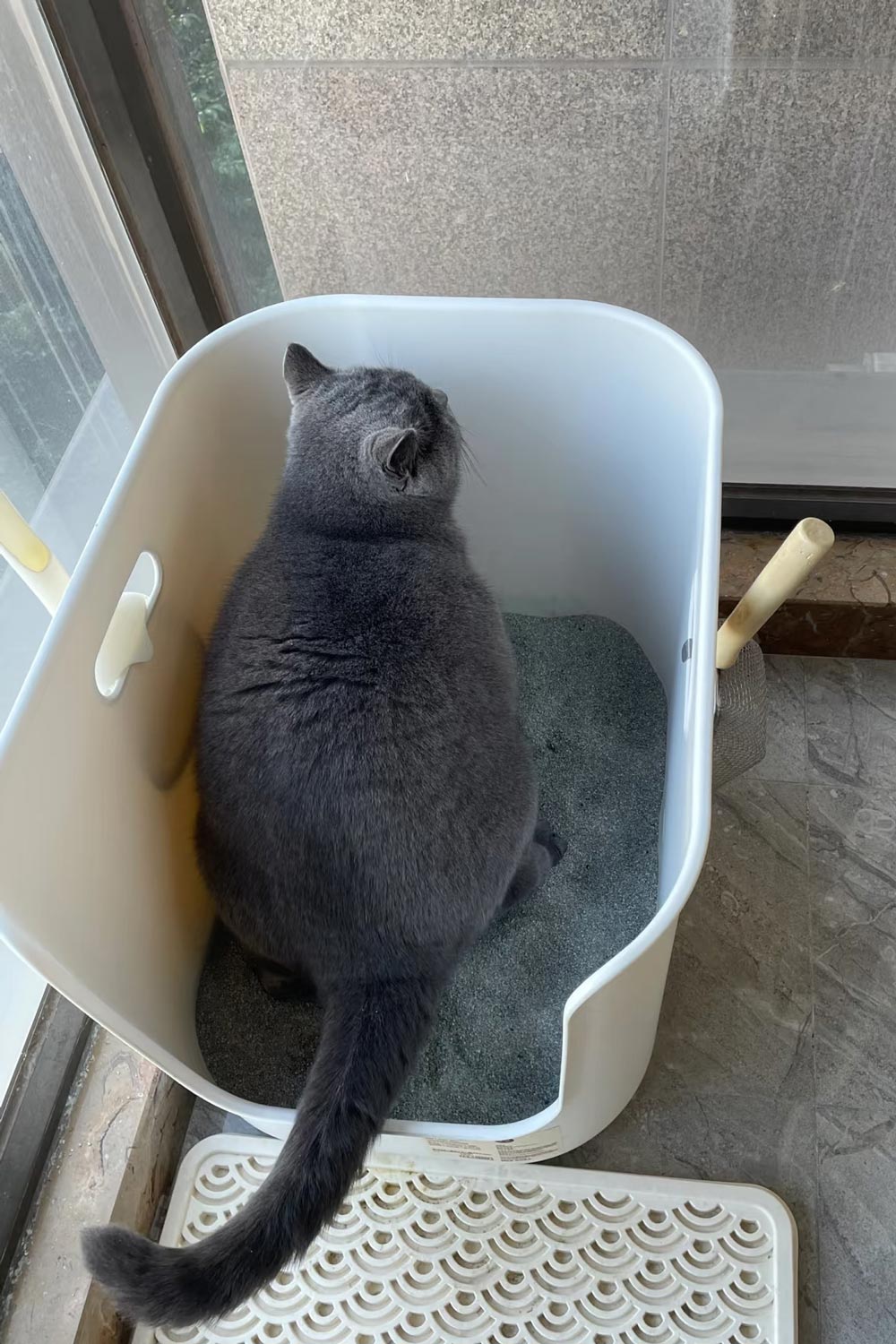Ah, the joys of cat parenthood—soft purrs, playful antics, and…a litter box that could scare away even the bravest of visitors. Don’t worry, we’ve got your back (and your nose). These 10 tips will have your cat’s bathroom smelling like, well, anything but a bathroom.

Clean the Box More Often
Keeping the litter box clean daily helps eliminate odors before they start. By removing waste twice a day, you’re cutting off the source of the smell at its strongest. Use a durable scoop to easily collect clumps, and dispose of them in a sealed trash bag to keep everything fresh.
Wash The Litter Box Once A Week
A weekly scrub of the litter box prevents stubborn odors from lingering. Residue builds up over time, even in the cleanest-looking box. Use mild soap and warm water, rinse thoroughly, and let it dry completely before refilling with fresh litter.
Use Baking Soda
Baking soda is a powerful, natural odor absorber. Sprinkle a thin layer on the bottom of the box before adding litter. This creates a barrier that captures smells without overwhelming your cat with artificial scents. Other options include dried green tea leaves and vinegar.
Add Litter Box Additions
Keep the mess contained and clean up simply by upgrading your litter box setup. Start with a sturdy litter box liner that makes replacing the litter hassle-free while preventing waste from sticking to the bottom of the box. Next, place a cat litter mat right outside the box. These mats trap loose litter from your cat’s paws, preventing it from spreading around the house.
For even more convenience, consider mats with soft, non-slip surfaces for your cat’s comfort. This combo not only keeps your floors clean but also minimizes the time you spend sweeping up stray litter.
Pick the Right Location
Fresh air makes a big difference in odor control. Place the litter box in a well-ventilated room, away from closed corners. If possible, use a small fan or crack a window to keep air circulating and odors moving out.
Invest in a High-Quality Litter
Not all litters are created equal, and some are better at masking odors than others. Clay litter has long been known for its strong smell-trapping abilities. However, if you’re looking for a more eco-friendly option, try pine or recycled paper litter. Just make sure to research and read reviews before making a purchase.
Try an Automatic Cleaning System
If you’re tired of scooping litter every day, an automatic cleaning system may be the solution for you. These high-tech boxes use sensors or timers to automatically sift through and remove clumps, leaving a clean layer of litter for your cat’s next use. Keep in mind that these systems do require some maintenance and regular refilling of litter, but they can save time and effort in the long run.
Feed High-Quality Food
What goes in affects what comes out. Low-quality cat food with fillers often results in stronger-smelling waste. Opt for high-quality food with real meat as the first ingredient, which supports digestion and reduces stink.
Use a Cat Odor Eliminator Around the Area
Even with all these measures in place, sometimes odors can still linger. In this case, a cat odor eliminator spray or powder can be helpful. These products are specifically designed to neutralize the unpleasant smell of cat waste and leave a fresh scent behind.
Have One Box Per Cat + One Extra
Cats prefer multiple bathroom options, especially in multi-cat households. The rule of thumb: one box per cat plus an extra. Spreading them out reduces territorial issues and ensures waste doesn’t pile up in a single spot, cutting down smells.
Why Does My Cat’s Litter Smell So Bad?

Understanding why your cat’s litter box smells so bad is crucial for maintaining a pleasant home environment. Here are a few detailed reasons behind those pungent odors and some tips on how to tackle them:
- Concentrated Urine: Cats naturally produce urine that is more concentrated than many other animals, leading to a stronger ammonia smell. This ammonia can be particularly offensive to humans, making it essential to use a litter that effectively absorbs and neutralizes this odor.
- Diet Matters: Your cat’s diet plays a significant role in the smell of their waste. Ammonia, a by-product of protein metabolism, can make the odor more intense. If the smell is overwhelming, consider experimenting with different protein sources in your cat’s diet, such as switching from chicken to tuna. Ensure your cat is also drinking plenty of water, as proper hydration can help dilute urine and reduce odor.
- Type of Litter: The type of litter you choose can greatly affect odor control:
- Clay-based Litter: While affordable and fairly absorbent, it may not offer the best odor control.
- Plant-based Litter: Made from eco-friendly materials like recycled paper, this type absorbs odors well but tends to be more expensive.
- Silica-based Litter: Known for excellent absorbency and odor control, making it a popular choice for managing strong smells.
- Clumping vs. Non-clumping: Clumping litters are preferred for odor control as they make it easier to scoop out waste, whereas non-clumping litters can leave behind odor-causing waste.
- Type of Litter Box: The size and material of your litter box matter. A box that is at least twice the size of your cat is ideal, providing enough room for them to move around. Avoid using plastic linings, as they can absorb urine and leak, exacerbating odors instead of controlling them.
